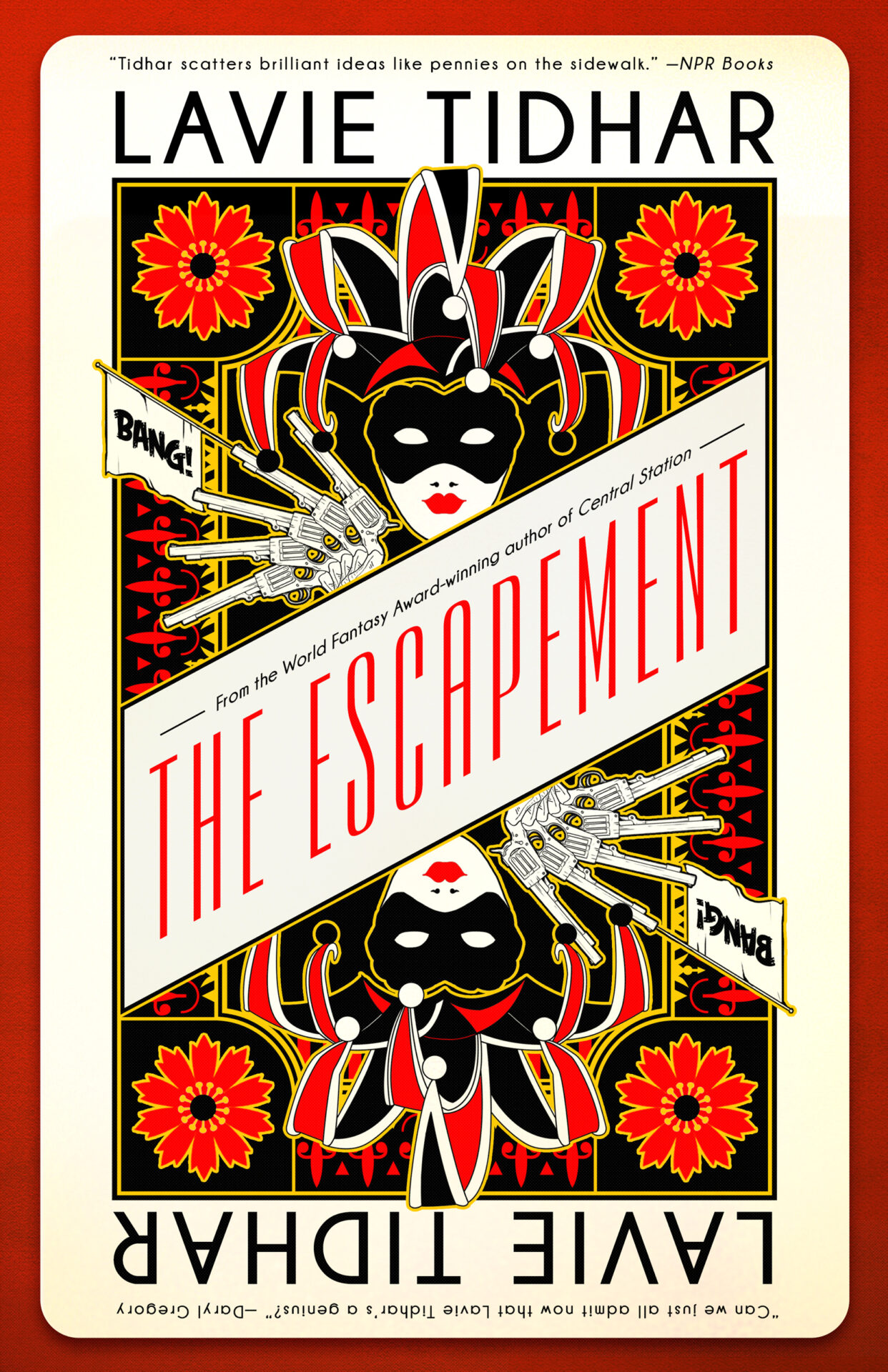
Lavie Tidhar is joining us today to talk about his novel, The Escapement. Here’s the publisher’s description:
Into the reality called the Escapement rides the Stranger, a lone gunman on a quest to rescue his son from a parallel world. But it is too easy to get lost on a shifting landscape full of dangerous versions of his son’s most beloved things: cowboys gone lawless, giants made of stone, downtrodden clowns, ancient battles, symbol storms, and shadowy forces at play.
But the flower the Stranger seeks still lies beyond the Mountains of Darkness. Time is running out, as he journeys deeper and deeper into the secret heart of an unforeseen world.
In his most compelling work to date, Lavie Tidhar has delivered a multicolored tapestry of dazzling imagery. The Escapement is an epic, wildly original chronicle of the extraordinary lengths to which one will go for love.
What’s Lavie’s favorite bit?

LAVIE TIDHAR
My favourite bit of The Escapement actually came shortly after I finished writing the book. It’s a book about a love of clowns, and of circuses, stage magicians, aerialists and so on, all filtered through Surrealism and Dali and picture books and Dr Seuss and strained through a Sergio Leone spaghetti western and mixed and shaken…
In one part it is the story of the Stranger riding across the fantastical landscape of the Escapement in search of the fabled Plant of Heartbeat, a flower that only grows beyond the Mountains of Darkness. In another, it is about a father sitting by his son’s bedside in a hospital room, watching the clock ticking as he reads the boy stories of cowboys and robbers, a discarded clown toy lying nearby…
Anyway.
Shortly after writing it I took a meandering walk with a friend through London, after a lunch I didn’t have to pay for. We were somewhere in the back of King’s Cross, in a quiet residential area, and came across a little green park and a children’s playground, where children were playing on the swings and on the trampoline and on the roundabout, in the way that children do.
Pretty full from lunch, we thought we’d find a bench in the park to sit on. As we went in, however, we discovered a curious sight. Just behind the children’s playground, set on its own in the middle of this little park, was a grave.
The grave was adorned with flowers, and it was decorated in iron by the twin masks of comedy and tragedy: the smiling and crying faces of the clown.
It was only when we approached (with some trepidation!) that we discovered that this was, indeed, the last resting place of Joseph Grimaldi: the man better known as The Father of Clowns.
He had been much on my mind over the writing of the novel, of course. There is a Grimaldi River somewhere on the Escapement (other notable places include Geller’s Bend and Curly’s Butte, though the last one appears only on the map we made for the book). But I had no idea I would soon stumble across his grave.
Grimaldi was born in London in the 18th century. He was perhaps the most successful entertainer of his era, and all but created the modern clown as we know it today. The church near the grave site hosts an annual pilgrimage of clowns, and keeps the Clown Egg Register which, yes, is a real thing.
There was a moment of such wonder for me in discovering the grave, and such a delight to find that it was directly behind a children’s playground. American horror had made the clown something of a nightmare creature, but I have nothing but admiration for the clown’s hard work and to the dedicated skill of buffoonery.
It was so peaceful there, too. It was a fine resting place for a clown.
I walked away lighter in heart. Grimaldi’s appearance felt like a sign, after the months I spent riding (if only in my own imagination) across the Escapement, with its mysterious clowns, ghostly vaudevillians and murderous conjurers. I had written about the mythical Harlequin, and here he was in person.
One day soon I’ll go back and visit him there, I think.
LINKS:
The Escapement Universal Book Link
BIO:
Lavie Tidhar (A Man Lies Dreaming, Unholy Land) is an acclaimed author of literature, science fiction, fantasy, graphic novels, and middle grade fiction. Tidhar received the Campbell and Neukom Literary awards for the novel Central Station, which has been translated into more than ten languages. He has also received the British Science Fiction, British Fantasy, and World Fantasy Awards. He is a book columnist for the Washington Post, and recently edited the Best of World Science Fiction anthology. Tidhar has lived all over the world, including Israel, Vanuatu, Laos, and South Africa. He currently resides with his family in London.
